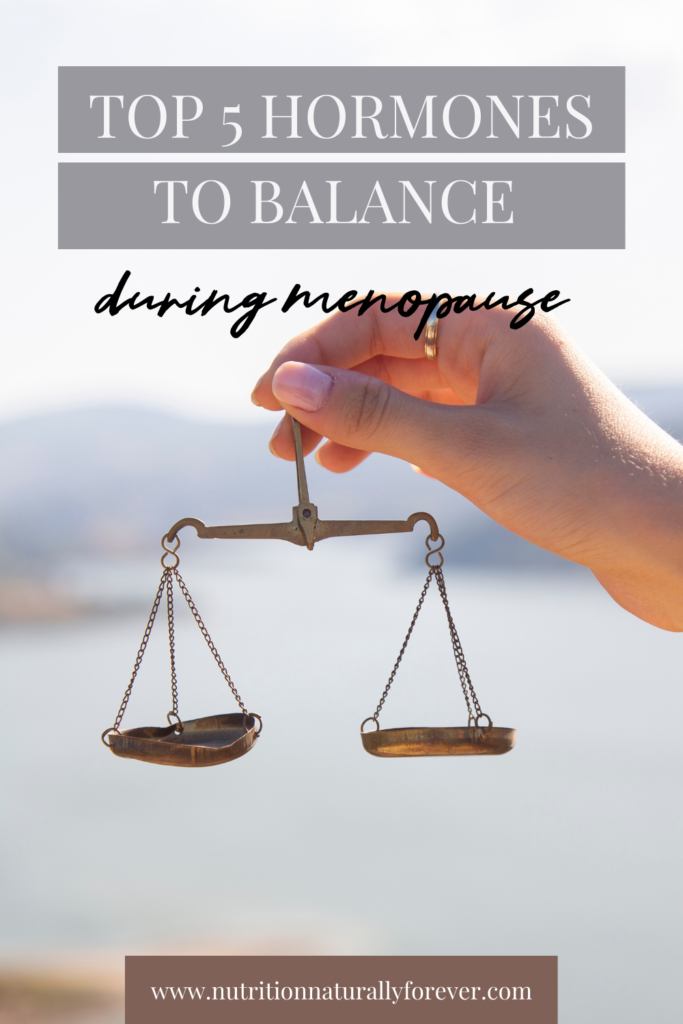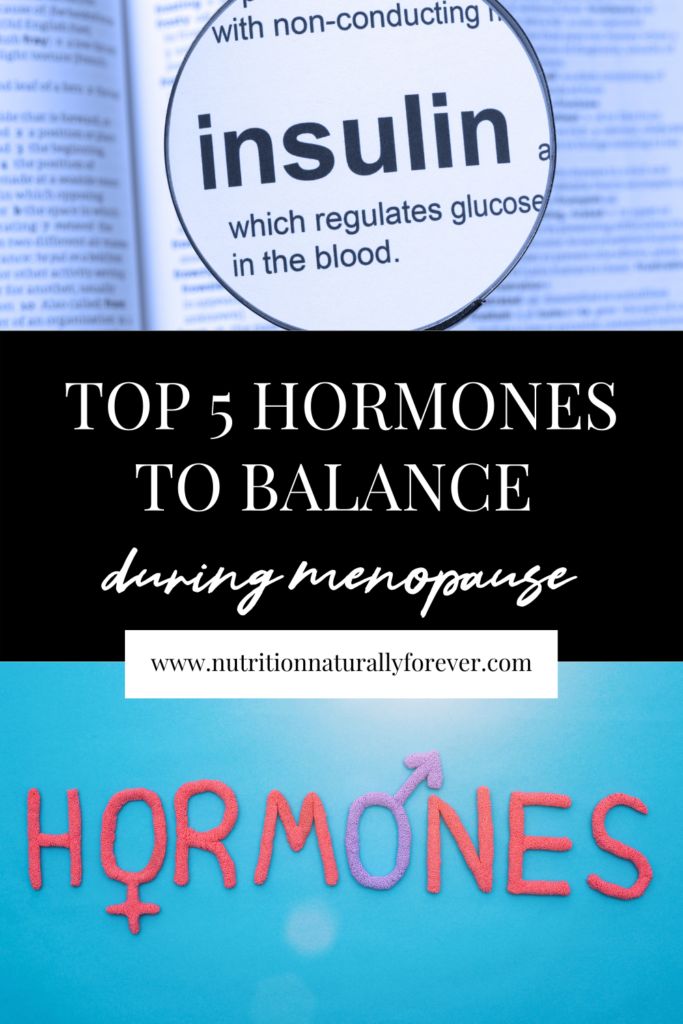
Top 5 Hormones to Balance (during menopause).
When talking about menopause and its many symptoms, we talk a lot about hormone balance.
Much of the fear surrounding menopause comes from a lack of understanding about what is going on in the body and feeling out of control.
I am passionate about breaking down this fear so that women can feel empowered at this time in their lives.
This week I will be diving deeper into what hormones are and their role in the body along with why they need to be balanced and how we can gain some control over this.
Below are what I consider to be the top 5 hormones to balance during menopause.
These are the areas I concentrate on in my practice.
Balancing these hormones will give relief from debilitating menopause symptoms and leave you feeling more like yourself again. Read on to learn more.
What are hormones & what do they do?
Scientists have identified over 50 hormones in the female body.
Hormones are molecules produced by the endocrine system.
They are released from glands in the endocrine system and work like a lock and key in different areas of the body, for instance, hormones (the key) can only be used with the appropriate hormone receptor (the lock) where they are needed in the body.
These hormones send messages all over the body helping to regulate processes, such as hunger, sleep, blood pressure, sexual desire, mood, metabolism… the list goes on!
How do you know if your hormones are out of balance?
Due to their power, if hormones become out of balance even slightly you will know about it.
From thirst and hunger to tiredness and fatigue and everything in between such as constipation, irregular periods, and skin issues. These are all signs of hormone imbalance.
Every day our body has this juggling act to perform to keep balanced.
Learning to listen to these signals and notice patterns over time helps you to anticipate your own needs and start to take control of your symptoms.
Lack of connection to our body and how it works along with living in a ‘quick fix’ society has led to a lack of knowledge and understanding which is driving fear around menopause – in my opinion… You can read more about my story and loss of connection to my body HERE.
What causes hormone imbalance?
As a menopause nutritional therapist, I am coming at hormone imbalance from a stage of life, just like puberty and pregnancy but there are other causes of hormone imbalance that are worth considering and getting further checks for, such as;
- Medications
- Autoimmune conditions
- Tumours or growths
If you are over 45 (although you certainly can be younger) and are experiencing niggling symptoms of menopause then looking at your lifestyle can help you start finding your way to hormone balance.
Let’s get on with the top 5 hormones you can work on balancing to improve your health and well-being.

INSULIN
Insulin is a hormone made in the pancreas.
It helps the body move glucose from all carbohydrates (starchy and non-starchy) to the appropriate cells for energy.
When our cells are full of energy but still more energy comes, insulin has nowhere left to take the excess glucose/energy and this causes high blood sugar.
The body is constantly trying to create balance.
To balance this high blood sugar insulin calls on the liver for help.
The liver increases fat cell production so that insulin has somewhere to offload the excess glucose and that is how carbs can ‘make you fat’.
Let’s not demonise carbs though.
They are essential for brain function. What we need to focus on is balancing blood sugar levels and we do this by eating BALANCED MEALS.
All meals and snacks need to include protein and healthy fats with carbs to balance the release of insulin with glucagon and keep blood sugar levels stable.
Stable blood sugar levels will help you fight tiredness and fatigue and also put your body into fat-burning mode rather than fat storing!
CORTISOL
When you think of cortisol you probably think of stress.
Cortisol is produced in the adrenal glands and is released in times of stress BUT it does so much more than this and understanding its function can help you keep it more balanced.
Cortisol can help control blood sugar levels, regulate metabolism, and help reduce inflammation. It is also involved in memory function and helps the body balance water and salt to regulate blood pressure.
Too much cortisol however can be caused by chronic stress and not having ways to relax within your lifestyle. It can also be caused by excess estrogen, this could be through changes during menopause or even oral contraception, medication, or an underlying health condition.
Untreated high cortisol can lead to cardiovascular disease and osteoporosis, two health issues women in menopause need to be protecting themselves from.
ESTROGEN
Estrogen is probably the most well-known sex hormone.
As we come to the end of our reproductive years the role of estrogen production falls to the adrenal glands, fat cells, bones, skin and liver.
Women experience a rise and fall of estrogen through their monthly cycle. As we enter perimenopause this rise and fall becomes more erratic and is responsible for many of the symptoms we experience whether that is due to high or low levels.
The goal of balancing estrogen is to make the highs and lows less intense.
Too much estrogen can lead to feelings of anxiety and depression along with heavy periods whereas low estrogen leads to hot flushes, irregular periods and sore boobs.
Including phyto-estrogenic foods in your diet such as soya, flaxseeds and cruciferous vegetables can act in a similar way to the estrogen produced by our body and attach to the estrogen receptors to balance levels.
If you are taking contraceptives or HRT this will also have an effect on your hormone levels and how they balance with your natural highs and lows.
MELATONIN
Melatonin is a hormone released by the pineal gland in the brain at night.
It helps the body sync to the circadian cycle, knowing when to wake and sleep.
When this hormone becomes imbalanced it can lead to sleep issues and even insomnia.
Lack of sleep negatively impacts other hormones in the body such as leptin and ghrelin, our hunger and satiety hormones, along with insulin.
Creating an evening routine which supports melatonin release such as reducing light a few hours before bed, especially from electrical devices. Using tinted glasses can help if you have to work late.
Milk contains melatonin so it is no surprise a cup of warm milk is a traditional bedtime drink, if you can’t tolerate dairy then nuts such as pistachios and almonds help the body produce melatonin.
DOPAMINE
Dopamine is a type of neurotransmitter and hormone.
It is important for many functions in the body such as memory,and motivation and is probably most commonly known for pleasurable reward.
Many of our habits which don’t support long-term health are linked to a quick release of dopamine which is why these habits are so hard to break.
An imbalance of this hormone is associated with several mental and neurological health diseases.
Try finding a pleasurable activity that supports your health and well-being goals that you can use to start upgrading your feel-good habits.
Putting it all together
Hormones and neurotransmitters are made from protein.
Ensuring each meal and snack you eat will support hormone balance by ensuring your body has enough raw materials available to make the hormones it needs.
Looking at your lifestyle in a holistic way, focusing not only on nutrition and movement but resting and recovering effectively from physical exertion, along with, taking care of your emotional health, and doing things that bring you joy and lift your soul will all add to hormone balance.
Unfortunately, there isn’t a magic pill you can take and all symptoms of menopause will magically disappear.
It is our responsibility to educate ourselves and take the best care of our health and well-being to ensure we are full of energy and motivation to live our best life now and well into the future.
Work With Me
If you would like to find out more about my online hybrid Empowered Menopause Journey Programs or Monthly Membership, follow THIS LINK.
Or Book a complimentary 30-minute menopause assessment with me and we can chat about your individual symptoms and requirements.
